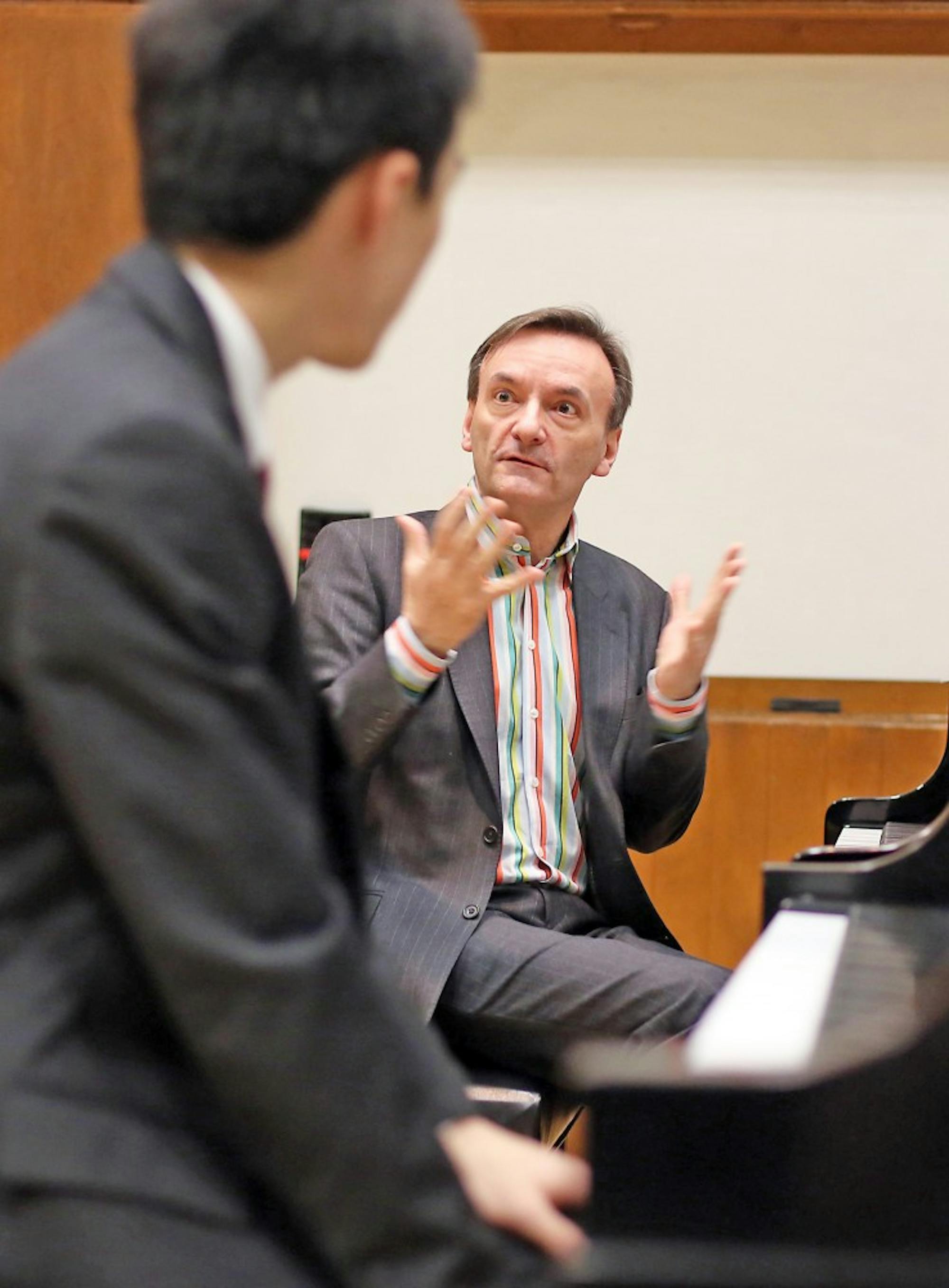Last week renowned British concert pianist, writer and composer Stephen Hough visited Dartmouth. In addition to performing a concert at the Hopkins Center for the Arts on Saturday, Hough taught a piano master class and attended a dinner and discussion the day before.
Hough gave two 45 minute master class lessons to two first year piano students. Students involved in Dartmouth’s music department, as well as many other students, faculty members and residents of Hanover observed. Attendees filled Faulkner Hall to capacity seating, while a few stood near the back walls and aisles. Andrew Liu ’19 played Schumann’s “Symphonic Etudes” (1834), a set of more “wild” studies by the German composer, Hough said.
Although Hough had not played this study personally, he gave some advice on the general expression of the piece, suggesting that Liu emphasize more of Schumann’s ecstaticism, who he insisted was on the “right side of crazy,” while also warning that he not overemphasize the sustaining pedal on the piano.
Christina Bae ’19 played the first movement from Prokofiev’s “Sonata No. 4, in C minor” (1917), a somber piece played rather infrequently in the piano world, Bae said. Bae noted that this uncommonness, as well as the very different style of Prokofiev’s sonatas, led her to choose this piece for her master class lesson.
Hough said that he had not heard this piece before, but suggested that Bae make more of a “shrieking” sound while maintaining an even tone.
Both Liu and Bae said that this sort of advice focused on expression is typical of master classes, while their regular teachers typically focus on technique.
Nevertheless, many of the observers of the master class found something unique about Hough’s teaching. Selma Bornstein, a resident of the Hanover area who had watched the master class, said that Hough was “generous in his approach as a teacher,” noting in particular his sense of humor during the master class and his very “sensitive” nature.
In the question and answer portion after the class, Hough emphasized that one shouldn’t feel any guilt about restarting practice after a long break, but rather view practice as a way to re-engage with music.
And to those who worry that it is too late to get started with their passions, or were somewhat unproductive in their younger years, Hough said, “We are what we are. Every day is a fresh start.”
On Saturday at 8 p.m. Hough gave a concert at the Hop that lasted approximately two hours, followed with a post-performance discussion. Noting that his pieces this season were “much more severe” than those of his last season in his post-performance discussion, Hough began with Schubert’s “Sonata in A minor, D. 784” (1839), a piece with a lot of frantic jumps, dissonance and somber tones. The piece was composed by Schubert near the end of his life.
In his post-performance discussion, Hough said that this sonata was “very severe,” with absolutely “no light in the piece.” Hough then followed with “Prelude, Chorale, et Fugue, Op. 21” (1884) by 19th century Belgian composer César Franck.
Program annotator Richard E. Rodda said Franck presents a “meeting of sacred and profane” that continues a theme of tension found throughout Hough’s selections while also presenting, as Hough noted in his post-performance discussion, a transition from the dark to the light.
After the intermission, Hough began with a piece he wrote himself, entitled “Sonata No. 3 (Trinity)” (2015). Commissioned by The Tablet, a Catholic weekly review, Hough wrote this particular piece using the 12-tone technique, part of an abstract movement in music called serialism, which focuses on the use of structure. Hough noted in the program that he uses this structure to represent the dogma of the Catholic church, using “rules which can liberate and enslave.” The piece, like Franck’s, uses this contrast between warm, familiar chords and sharp arpeggios and dissonance, to express this same sense of tension.
Unlike the other pieces in his performance, which are memorized, Hough makes sure to read the music while playing this piece. In the post-performance discussion, Hough said that he does this to create a distinction between himself as a composer and himself as a performer, although he also said that this piece is much more random and much less intuitive than the other pieces he plays.
Following this, Hough presented two pieces by Franz Liszt, a popular musician who in his time was famous for his glittery waltzes. The first was “Valses Oubliées No. 2” (1881-1884) a series of waltzes written in the Austrian composer’s later years. Yet despite the bright nature of these Viennese waltzes, there is a sense of age in these pieces. As the waltzes begin to halt, Hough twitches with the music as if he is falling, mirroring the age of the composer himself. Yet the music began to get brighter, despite this remaining theme of tension, as he transitions to Liszt’s “Two Transcendental Etudes” (1852) presenting a more operatic theme, both Hough and Rodda said.
In his encore, Hough played two pieces markedly brighter than those of the rest of his performance. Hough began with Edward Elgar’s “Salut d’Amor, Op. 12” (1888), a gentle, romantic piece typically played by piano and violin duos. His second encore, a selection from Ludwig Minkus’s ballet score for “Don Quixote” (1869) also felt much lighter. Hough said the piece was easy to dance to. This change in theme represents Hough’s varied repertoire.
“I love playing everything,” Hough said in the post-performance discussion.
Many attendees were pleased with the performance and post-performance discussion. Jessica Tong ’17 and Rebecca Philip ’19, both self-proclaimed fans and pianists, said that they liked the discussion, saying that they appreciated hearing that a world-class pianist struggles with the same issues that students do.
Praising him for his sense of humor and his musical talent, many were glad to see Hough come to Hanover despite the inclement weather.




